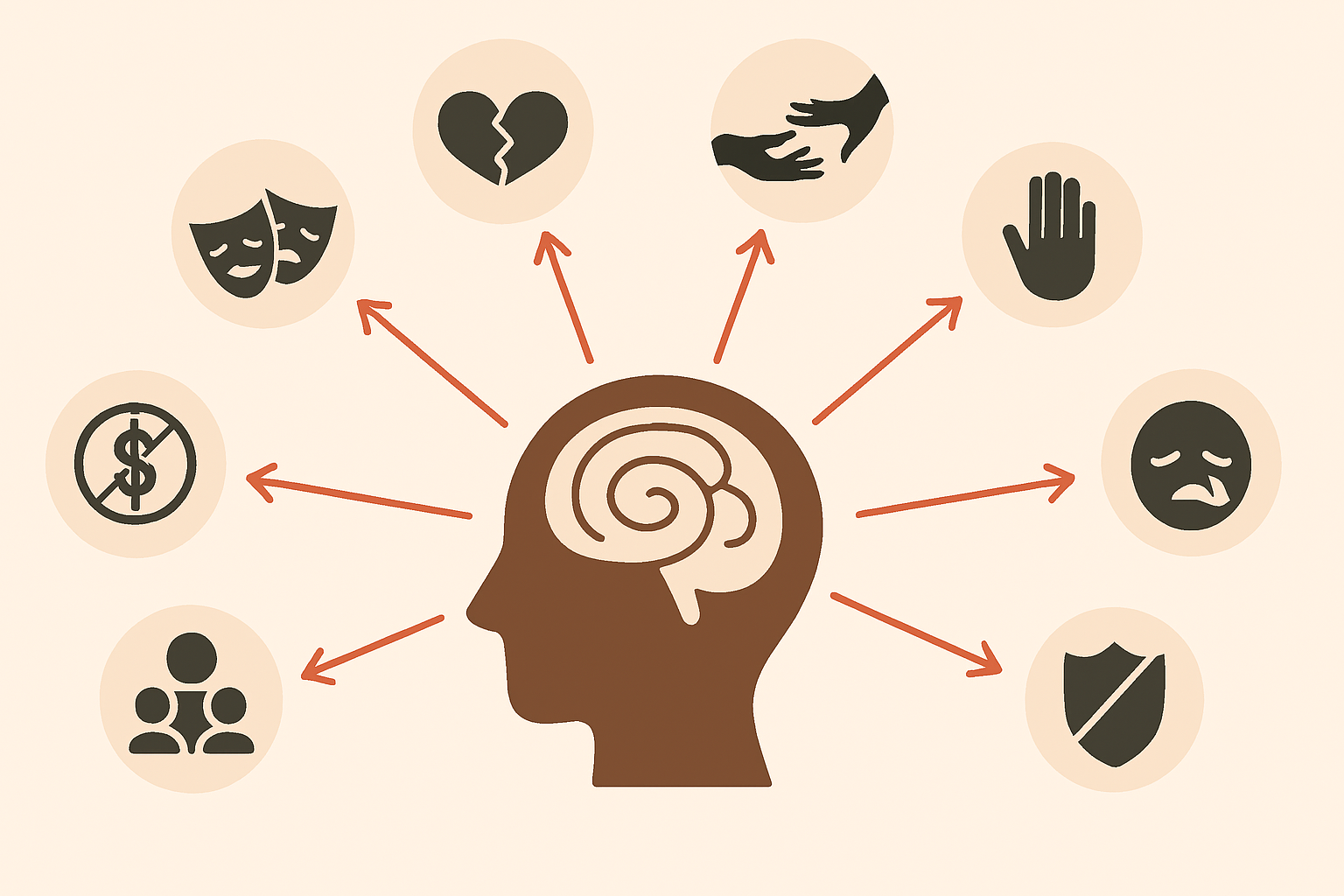آیا تا به حال احساس کردهاید که در یک چرخه تکراری گیر افتادهاید؟ مثلاً، هر چقدر تلاش میکنید، روابط شما به نوعی شکست میخورد، یا همیشه به این فکر میرسید که «من به اندازه کافی خوب نیستم»؟
شاید مواقعی بوده که با وجود موفقیتهایتان، هنوز احساس ناکافی بودن دارید، یا دائماً در حال جستجوی تأیید دیگران هستید.
این احساسات برای بسیاری از ما آشنا هستند، زیرا ریشه در چیزی به نام طرحواره دارند.
طرحواره چیست؟
طرحواره مانند یک جفت عینک نامرئی است که از کودکی آن را به چشم زدهایم. این عینکها باعث میشوند که ما جهان، مردم و حتی خودمان را از یک دیدگاه خاص ببینیم. گاهی اوقات، آنقدر به این عینکها عادت کردهایم که حتی متوجه نمیشویم از طریق آنها به جهان نگاه میکنیم.
طرحوارهها، در واقع، باورهای عمیقی هستند که از تجربیات کودکی و روابط اولیه ما شکل گرفتهاند و اکنون مانند یک الگو، رفتار و احساسات ما را هدایت میکنند.
انواع طرحوارهها
• رها شدگی / بیثباتی: ترس مداوم از تنها ماندن یا رها شدن.
• بیاعتمادی / سوءاستفاده: باور به اینکه دیگران به شما آسیب میرسانند یا از شما سوءاستفاده میکنند.
• محرومیت عاطفی: احساس اینکه هیچ کس نمیتواند نیازهای عاطفی شما را برآورده کند.
• نقص / شرم: باور به اینکه شما بیارزش هستید یا «به اندازه کافی خوب نیستید».
• انزوا / بیگانگی اجتماعی: احساس متفاوت بودن یا تعلق نداشتن به یک گروه.
• وابستگی / ناکارآمدی: این فکر که بدون کمک دیگران نمیتوانید زندگی را مدیریت کنید.
• آسیبپذیری در برابر آسیب یا بیماری: ترس بیش از حد از اینکه هر لحظه ممکن است اتفاق بدی بیفتد.
• خود نابالغ / درهمتنیدگی: ناتوانی در جدا شدن از والدین و تشکیل هویت مستقل.
• شکست: باور به اینکه همیشه شکست میخورید یا کمتر از دیگران توانا هستید.
• استحقاق / بزرگنمایی: این ایده که قوانین برای شما اعمال نمیشود و همیشه باید امتیازات ویژه داشته باشید.
• کنترل ناکافی بر خود / انضباط شخصی: ناتوانی در کنترل احساسات، تکانهها یا به تأخیر انداختن رضایت.
• تسلیم: همیشه قربانی کردن خواستهها و نیازهای خود برای دیگران.
• فداکاری: دائماً اولویت دادن به نیازهای دیگران بر نیازهای خود، حتی به ضرر خود.
• جستجوی تأیید / جستجوی شناخت: وابستگی شدید به نظرات و قضاوتهای دیگران.
• منفیبافی / بدبینی: تمرکز مداوم بر جنبههای منفی زندگی و انتظار بدترین نتیجه.
• بازداری عاطفی: سرکوب احساسات و عواطف خود به دلیل ترس از قضاوت یا طرد شدن.
• استانداردهای سختگیرانه / انتقاد بیش از حد: همیشه تلاش برای کمال و بهترین بودن؛ هرگز راضی نیستید.
• تنبیهگرایی: بیش از حد سختگیر و تنبیهکننده بودن نسبت به خود یا دیگران هنگام بروز اشتباه.
طرحوارهها چگونه شکل میگیرند؟
طرحوارهها باورهای عمیقی هستند که از تجربیات کودکی و روابط اولیه شکل میگیرند. وقتی کودک هستیم، مغز ما الگوهایی برای درک جهان و محافظت از خود ایجاد میکند. اگر محیط ناپایدار، طردکننده یا غفلتآمیز باشد، باورهایی مانند «من کافی نیستم»، «دیگران قابل اعتماد نیستند» یا «همیشه تنها خواهم ماند» شکل میگیرند.
این باورها بعداً در روابط و موقعیتهای جدید تکرار میشوند و باعث میشوند که ما همچنان احساس تهدید یا ناکافی بودن داشته باشیم، حتی زمانی که همه چیز خوب پیش میرود.
کاربردهای درمان طرحواره
• شناسایی الگوها
اول از همه، به شما کمک میکند که بفهمید کدام طرحوارهها در شما فعال هستند و چه رفتارها یا احساساتی ایجاد میکنند.
مثال: «من همیشه در حال جستجوی تأیید دیگران هستم» → این ممکن است طرحواره جستجوی تأیید باشد.
• درک ریشهها
به جای سرزنش خود، یاد میگیرید که این باورها نتیجه تجربیات کودکی و محیط گذشته شما هستند.
• تغییر آگاهانه رفتار
وقتی الگوها را شناسایی کردید، میتوانید به جای اینکه توسط طرحواره قدیمی کنترل شوید، به صورت آگاهانه رفتار و واکنشهای خود را مدیریت کنید.
مثال: کسی که طرحواره ترس از رها شدگی دارد، از طریق تمرینات درمانی یاد میگیرد که به جای چسبیدن به دیگران یا کنترل آنها، اعتماد کند و مستقل باشد.
• بهبود روابط و احساسات
با تغییر طرحوارهها، میتوانید روابط سالمتری برقرار کنید و احساس رضایت بیشتری داشته باشید، زیرا دیگر توسط باورهای مخرب کودکی هدایت نمیشوید.
به طور خلاصه: درمان طرحواره به شما کمک میکند که بفهمید چرا برخی رفتارها یا احساسات تکراری هستند، ریشه آنها را پیدا کنید و سپس به صورت آگاهانه آنها را تغییر دهید.
زندگی اغلب تکرار میشود، نه به این دلیل که ما بد عمل میکنیم، بلکه به این دلیل که طرحوارهها، مانند نقشههای ذهنی قدیمی، مسیر احساسات و رفتار ما را هدایت میکنند. شناسایی این نقشهها به ما این فرصت را میدهد که چرخههای تکراری را بشکنیم، انتخابهای جدیدی داشته باشیم و نسبت به خود و روابطمان احساس بهتری داشته باشیم.
به زبان ساده: وقتی میفهمیم چرا واکنشهای ما همیشه یکسان است، میتوانیم راه جدیدی برای زندگی بسازیم.


